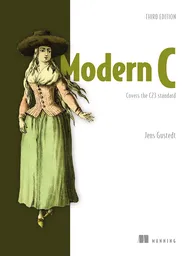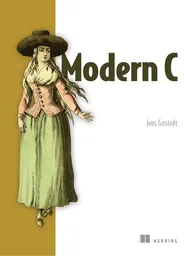books by Jens Gustedt
Modern C, Third Edition
Modern C, Third Edition is a fast-paced introduction to the C language, with special attention on its most modern features. It starts with a quick review of structure, grammar, and execution and then progresses quickly to control structures, data types, operators, and other core language features. Fully revised for C23, this expanded Third Edition covers compound expressions and lambdas, new insights into approaching program failure, and how to transition smoothly to C23.
Modern C
Modern C introduces you to modern day C programming, emphasizing the unique and new features of this powerful language. For new C coders, it starts with fundamentals like structure, grammar, compilation, and execution. From there, you’ll advance to control structures, data types, operators, and functions, as you gain a deeper understanding of what’s happening under the hood. In the final chapters, you’ll explore performance considerations, reentrancy, atomicity, threads, and type-generic programming. You’ll code as you go with concept-reinforcing exercises and skill-honing challenges along the way.


